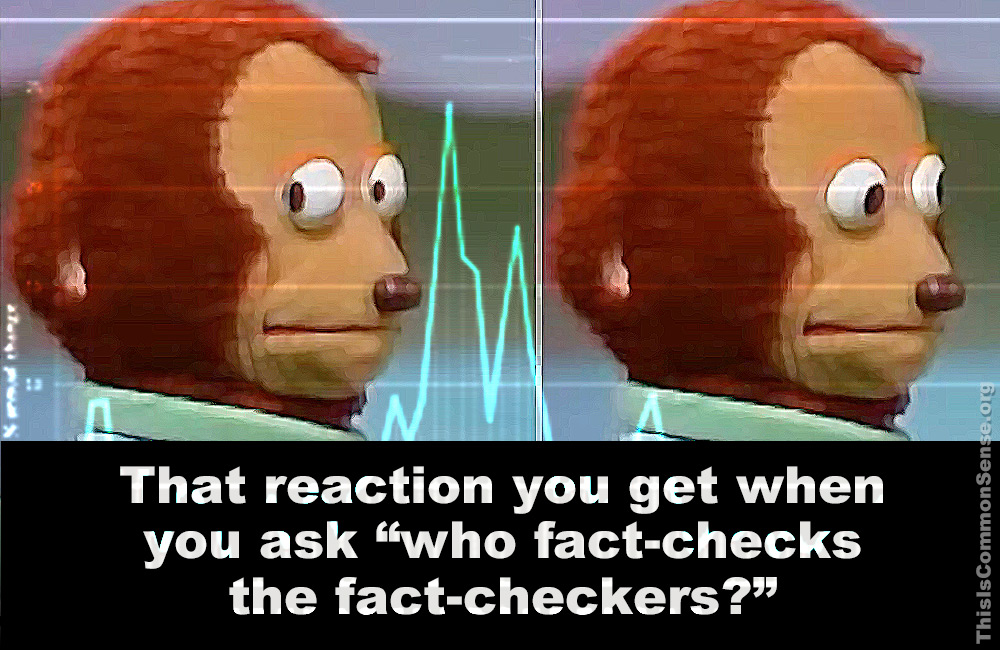Thesis: we’re entering recession, but the Biden administration disagrees.
For political reasons.
May we discuss?
Sure, here in Common Sense. (We’ve yet to censor or flag ourselves.) Big Tech social media is a different story.
Loath to preside over an officially designated recession, the Biden administration suggests that when you look at all the data in just the right light, it’s “unlikely that the decline in GDP in the first quarter of this year — even if followed by another GDP decline in the second quarter — indicates a recession.”
Others disagree, saying the familiar definition cannot be so summarily dispatched. On Instagram, poster Graham Allen cheekily asked Siri how we know it’s a recession. Her reply: “two consecutive quarters of negative growth.”
Not a sacrosanct indicator, but standard.
Enter the Guardians of Discourse.
Meta (which owns Facebook and Instagram) has flagged Allen’s post as “false information” and in some cases prevented viewers from seeing it.
The “independent” fact checker on duty was Politifact, which warned Web surfers it just ain’t so that “the White House is now trying to protect Joe Biden by changing the definition of the word recession.”
This is where we’re at. Discussion of political motives at the White House has become so hazardous that the People of the Fact Check must rush to repudiate any intimation that any assiduous politics is going on. It’s all just assiduous data comparison.
Well, reality check: “fact checks” can be biased too.
This is Common Sense. I’m Paul Jacob.
—
See all recent commentary
(simplified and organized)

10 replies on “Receding From the Facts”
Experimentation by Phil Magness — whose earlier entries were defaced by “fact-check” notices and whose objections drew some international attention — suggest that Meta has abandoned this widely ridiculed effort to insist that O̶c̶e̶a̶n̶i̶a̶ ̶h̶a̶s̶ ̶a̶l̶w̶a̶y̶s̶ ̶b̶e̶e̶n̶ ̶a̶t̶ ̶w̶a̶r̶ ̶w̶i̶t̶h̶ ̶E̶a̶s̶t̶a̶s̶i̶a̶ the conventional definition of ‘recession’ has never been two-or-more consecutive quarters of declining GDP.
But, of course, this attempt was just one of many by Meta to falsify reality through “fact-checking”, and it will surely not be the last. Nor is Meta the only institution involved in the grand effort to over-write fact with narrative.
Can you name another recession where the unemployment rate was under 4%?
The “official” unemployment rate, as opposed to the real rate, which is somewhere in the neighborhood of 23%.
shadowstats.com
In other words, you CAN’T!!!!!
Pam, see my remarks below about the recessions of 1953 and 1970. And further see my points about the poor quality of the unemployment statistic.
These days, employment is being sustained by a precipitous drop in wages. That drop is not obvious to some people, because it is being effected by price-inflation. But a worker has less-and-less purchasing power with each paycheck.
Pam, the unemployment statistic is a lagging indicator of recession, and the recessions of 1953 and 1970 had unemployment statistics of less than 4% in their early stages.
Mind you that the unemployment statistic is not is not a very good one. On the one hand, it counts as unemployed people who are making attempts only pro forma to get a job. On the other hand, it does not count people who would like employment but have abandoned hope. And we are all aware of people counted as employed but unable to get a forty-hour job.
Even Bill Clinton was quoted saying it is two negative quarters.
.
If you look below the official numbers, we have probably been in a recession longer than two quarters.
Unemployment now down to 3.5%.
Pam, the unemployment rate at the start of the 1953 recession was about 2½%.
The unemployment statistic is a leading indicator. In every recession for which we have statistics, unemployment has been at or near a local minimum at the start of the recession, and has peaked after the end of the recession.
As I’ve explained, in the present situation of stagflation, “employment is being sustained by a precipitous drop in wages. That drop is not obvious to some people, because it is being effected by price-inflation”.
In anticipation of what statistics may be yet to come from you, Pam, I also note that, during the time of the previous stagflation, the employment statistic grew in the early stages of each recession.